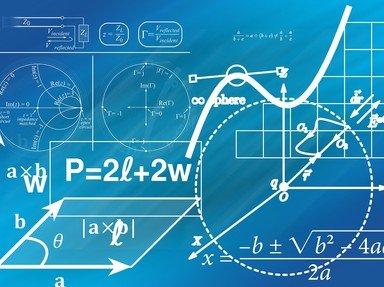Quiz Answer Key and Fun Facts
1. Gregory opens up a savings deposit in the bank and deposits an initial $1000. The bank is rather eccentric and reports the total amount of earnings in exponential equations. When Gregory returns to the bank one day, the bank clerk gives him this equation:
2^(x+4) = 8^(3x)
Multiply x to your original deposit; this number is the amount of interest earned. Now add the amount of interest earned to the initial deposit to find the total amount of money in his savings deposit.
How much money is in Gregory's saving deposit?
2. Four students are at the last question in a math contest. Whoever answers this question correctly wins first place:
If x>0, solve: x^x^x^x^x^... = 2
Basically the x is infinitely raised to the x power; it's an infinite power tower.
Each of the students submit an answer:
Samantha: e^pi
Fredrick: e
Ariel: 2^(1/2)
Timothy: 3^(1/2)
Assuming that each of the answers are different numerical values, who won first place in the contest?
3. Jennifer goes to her local deli. She takes a ticket that has her place number. The number determines what order the customers will be served. For some strange reason her ticket says:
Simply x. The exponent of x is your place:
((x^-1)*(x^3))/((x^6)*(x^-10))
What place is Jennifer?
4. William is sending out applications for colleges. He's been thinking of applying to the School of Powers; however, the school only accepts students with HPA's (High School Point Average) greater than or equal to 5.5. William's HPA is the sum of coefficients in the expression below divided by 16.
(a^2 + b^2 + c^2 + d^2 + e^2 + f^2 + g^2 + h^2)^2
Does William qualify for the School of Powers?
5. Spencer is taking an exponents test in her math class. One of the questions asks her to write down all the debated values of 0^0. So, she writes down:
1
-1
undefined
For each correct value she gets 3 points. How many points does she earn on this question?
6. Brendon asks Alex to play a little game of chance. Brendon tells him that he must role a fair six-sided die. Whatever number Alex gets, he must plug it into:
[x^9 + 7x^7 - x^6 + 3x^4 + 24x]^0
If the value Alex gets is higher than or equal to 10, he wins one dollar. But, if the value Alex gets is lower than 10, Brendon wins one dollar. Should Alex play this game?
7. Alice has just lost a number of baby teeth and is planning to put them under her pillow so that the "Tooth Fairy" will reward her with spare change. Although she may believe in the Tooth Fairy, she's quite skilled at mathematics. Her mother wants to know how many teeth she's lost so that she can remember to keep that amount of quarters during the day. Alice writes the following down on a scrap piece of paper:
27^(3x) = 3^(5x+8)
Find the value of x and you'll know how many teeth I've lost.
How much money will Alice's mother need if she will give 25 cents for each tooth?
8. Harrison's neighborhood can be plotted on a Cartesian plane. The axes mark different boundaries of different properties. Each quadrant is one neighbor's property. One of the neighbors, Chris, is very territorial and will punish anyone who trespasses. One day Harrison's friends dare him to enter Chris' property. Although Harrison doesn't want to do it, he also doesn't want to be made fun of for being scared. Instead, he decides to walk in a path that makes it seem like he will enter the property, but will actually never do it (basically an asymptote). His path can be represented on the Cartesian plane as:
y = b^x when 0 < b < 1
In which quadrant is Chris' property?
9. Jackie is opening up a business, and she contacts her financial adviser. Jackie is wondering if she has enough funds to start a successful business. Jackie has "x" dollars for the equation x^3 = 100^6.
How much money does she have?
10. Jason's having trouble remembering the last number in his locker combination. Luckily for him he's written down the code, but in a mathematical form.
Starting at n=2, find the product of all the values of 9^(1/2^n) as n increases by one integer to infinity.
In other words, find the product of (9^(1/2^2))*(9^(1/2^3))*(9^(1/2^4))*(9^(1/2^5))*...
The product is the last number of Jason's code. So, what is his last code number?
Source: Author
dijonmustard
This quiz was reviewed by FunTrivia editor
crisw before going online.
Any errors found in FunTrivia content are routinely corrected through our feedback system.
